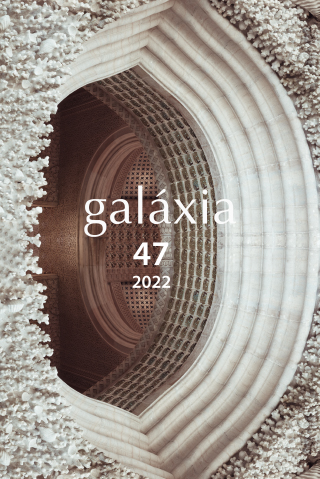On the urge of nonfiction: narrative journalism and its political and literary challenges
Keywords:
Latin American narrative journalism, fiction, witnessAbstract
In this paper, I investigate the recurrent statement made by Latin American writers and journalists about the impossibility of writing fiction in oppressive contexts. I analyze two narratives, Dead girls, by Selva Almada, and The vampires of reality only kill the poor, by Eliane Brum. The stories are presented as factual narratives of intervention. My hypothesis is that if fiction is claimed to be impossible, it is also essential since narratives of this kind demand it. I first discuss the emergence and ambiguities of the nonfiction notion and propose, based on Jacques Rancière, the understanding of fiction as an intelligible structure composed through the enchainment of certain situations and actors. This idea of fiction blurs the boundaries between literature and journalism. In the narrative analysis, I demonstrate the crossings from the documental to the literary and the way in which a certain fictional awareness is textually manifested, even in the face of the alleged urgency of nonfiction.
References
ADORNO, T. W. Posição do narrador no romance contemporâneo. In: ADORNO, T. W. Notas de literatura I. São Paulo: Duas Cidades; Ed. 34, 2003. p. 55-63.
AGEE, J; EVANS, W. Elogiemos os homens ilustres. São Paulo: Companhia das
Letras, 2009.
ALMADA, S. Garotas mortas. São Paulo: Todavia, 2018.
______. Dead girls. Edinburgh: Charco Press, 2020.
BOLAÑO, R. 2666. São Paulo: Companhia das Letras, 2010.
BRIZUELA, N. Posfácio. In: WALSH, R. Operação massacre. São Paulo: Companhia das letras, 2010. p. 259-270.
BRUM, E. A vida que ninguém vê. Porto Alegre: Arquipélago Editoral, 2006.
______. O olho da rua. São Paulo: Globo, 2008.
______. Os vampiros da realidade só matam pobres. In: LLOSA, M. V. et al. Dignidade. São Paulo: Leya, 2012. p. 25-50.
______. Meus desacontecimentos. São Paulo: Leya, 2014.
CAPOTE, T. Prefácio. In: CAPOTE, T. Música para camaleões. São Paulo: Companhia das Letras, 2006. p. 9-17.
COLLINGWOOD, R. G. The historical imagination. In: COLLINGWOOD, R. G. The ideia of history. London: Oxford at the Clarendon Press, 1946. p. 231-249.
D’AGATA, J. Não ficção. In: Serrote. São Paulo: Instituto Moreira Salles, 2015. n. 25. p. 160-163,
DE MAN, P. Autobiography as de-facement. MLN. Johns Hopkins University Press. v. 94, n. 5, Comparative Literature. Dez. 1979, p. 919-930.
FRUS, P. The politics and poetics of journalistic narrative. Cambridge: Cambridge University Press, 1994.
GAGNEBIN, J. M. Memória, história, testemunho. In: GAGNEBIN, J. M. Lembrar, escrever, esquecer. 2ª. ed. São Paulo: Ed. 34, 2006. p. 49-57.
ISER, W. Os atos de fingir ou o que é fictício no texto ficcional. In. LIMA, L. C. (org.). Teoria da literatura em suas fontes. Rio de Janeiro: Civilização Brasileira, 2002. v. 2. p. 955-987.
LEJEUNE, P. O pacto autobiográfico. Belo Horizonte: Editora UFMG, 2008.
LUKÁCS, G. Narrar ou descrever? In: LUKÁCS, G. Marxismo e teoria da literatura. 2ª. ed. São Paulo: Expressão Popular, 2010. p. 149-185.
PERES, A. C. O que resta dos fatos. Tese (Doutorado em Comunicação). Universidade Federal Fluminense. Niterói, RJ. 2017.
MALCOLM, J. O jornalista e o assassino. São Paulo: Companhia das Letras, 2011.
MOLINA, S; GOLDONI, R. P. Apresentação. In: WALSH, R. Essa mulher e outros contos. São Paulo: Ed. 34, 2010. p. 7-14.
RANCIÈRE, J. A partilha do sensível. 2ª. ed. São Paulo: Editora 34, 2009.
______. O espectador emancipado. Lisboa: Orfeu Negro, 2010.
______. O fio perdido. São Paulo: Martins Fontes, 2017.
RODRÍGUEZ, S. G. Huesos en el desierto. Barcelona: Anagrama, 2002.
SELIGMANN-SILVA, M. O local da diferença. São Paulo: Editora 34, 2005.
VIDAL E SOUSA, C. Repórteres e reportagens no jornalismo brasileiro. Rio de Janeiro: Editora FGV, 2010.
WALSH, R. Operação massacre. São Paulo: Companhia das letras, 2010.
______. Entrevista a Ricardo Piglia. In: WALSH, Rodolfo. Essa mulher. São Paulo: Editora 34, 2010a. p. 233-247.
WATT, I. A ascensão do romance. São Paulo: Companhias das Letras, 1990.
WHITE, H. The historical text as literary artefact. In: FAY, B; POMPER, P; VANN, R. T. History and theory. Oxford: Blackwell, 1998. p. 15-33.
WOLFE, T. Radical chique e o novo jornalismo. São Paulo: Companhia das letras, 2005.
Downloads
Published
How to Cite
Issue
Section
License
Copyright (c) 2021 Márcio Serelle

This work is licensed under a Creative Commons Attribution 4.0 International License.
I cede the copyrights to publication of my article to Galaxia journal and will consult the journal’s scientific editor should I decide to republish it later in a book.



 Este obra está licenciada com uma Licença
Este obra está licenciada com uma Licença 